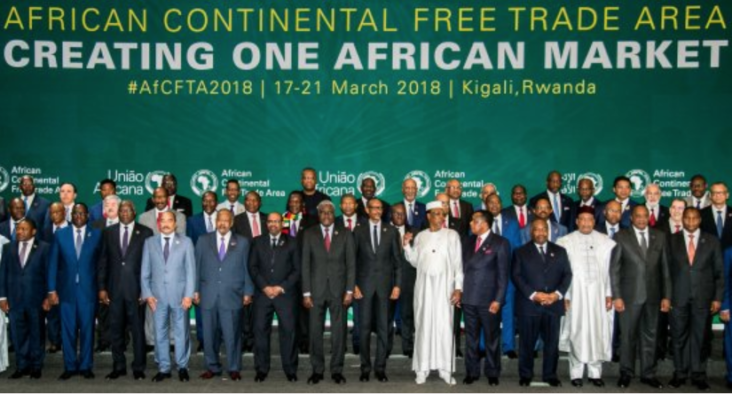The African Continental Free Trade Area (AfCFTA) must not be allowed to fall by the wayside, according to experts, after its launch was postponed by the coronavirus pandemic.
The AfCFTA, which was due to be implemented on July 1, will be the largest free trade area in the world, uniting 1.3 billion people in a $3.4 trillion economic bloc, and came after protracted negotiations between the leaders of 54 African nations.
However, it was postponed in late April, with AfCFTA Secretary-General Wamkele Mene telling Reuters it was the “responsible thing to do” to avoid distracting leaders during the pandemic, adding that he was confident the deal will go through eventually.
The continent’s key trading partners, such as China, and now to a greater extent Europe and the U.S., have been blighted by the pandemic, while Africa has for the most part managed to avoid an exponential spread of Covid-19.
An opportunity amid the crisis
Given the impact of the outbreak on Africa’s traditional intercontinental trade routes, intra-Africa trade will be key to getting the region’s nations back up and running, according to Thomas Birgen, Nairobi-based Treasury Manager for AZA, Africa’s largest non-bank currency broker.
“We need to see a situation where your cargo isn’t returned at the port because you don’t belong to a certain economic bloc,” Birgen said in a recent webinar.
“Here in Kenya, we killed our textile industry because we import second-hand clothes from China and everywhere else. Now with the closure of borders, we cannot live without these products that we have become used to importing.”
Birgen noted the manufacturing of protective masks in Kenya and Nigeria as an example of the opportunities available for African nations to produce their own products and trade within the continent.
Executive Director of the International Trade Centre, Dorothy Tembo, told CNBC Africa that despite the risks to the AfCFTA’s implementation, African leaders had a unique opportunity to spur greater collaboration if specific policies were fast-tracked.
“This is a time for Africa to rethink and reposition itself. Part of what we are seeing is that there is a shift in the demand in the context of the different value chains that African companies and businesses are involved in,” Tembo said.
Like Birgen, she noted the shift in demand from textiles and garments to masks and health-related products, and suggested that other opportunities will also arise.
“It is a dark moment for Africa in terms of the public health impact, but it is also one that demands that on the economic side, we are not losing truck on the efforts that have been made, particularly with respect to the continental free trade area,” Tembo added.
AfCFTA will take time to fulfill its promise
Jeff Gable, chief economist at African banking group Absa, told CNBC that Africa should be “applauded and supported” for moving towards collaboration, while the rest of the world moves towards isolationism.
However, he cautioned that the necessary integration will take much longer than two or three years, with smaller economies unlikely to see any early benefit as businesses will need to be created from scratch to participate in core value chains.
“For manufacturers in Ghana, this is great news — for Kenya, South Africa,” he said. “But this doesn’t suddenly unleash a manufacturing boom in the DRC (Democratic Republic of the Congo).”
A common qualm with intercontinental trade is that African nations extract and export raw materials, which are then manufactured into products elsewhere and shipped back with a substantial value addition.
Gable said that AfCFTA “does not change that very quickly” due to massive discrepancies in the industrialization of component economies.
“There are very few examples of economies on the (African) continent that capture enough of a value chain that you can really call it a manufacturing sector. South Africa runs a huge trade surplus with the rest of the continent because we trade in consumer goods, we trade in investment goods, and so on, but that is not true for Botswana,” Gable said.
Botswana’s economic output, he added, had not been “constrained by the lack of an African continental free trade agreement, vis-a-vis its relations with its neighboring countries.”
Gable also highlighted the logistical challenges faced by Africa’s existing regional economic communities, such as the East African Community (EAC).
“What you expect is that those borders are freed up to goods, and you should expect to see an export intensification between those countries. We’re now more than 10 years later and we’re not seeing much of that,” Gable said.
Trade frictions at borders between neighboring states have also become commonplace in recent years, creating logjams. Nigeria, Africa’s largest economy, for example, has been a regular purveyor of protectionist trade policies with its neighbors.
Latest Stories
-
We’ll embrace cutting-edge technologies to address emerging healthcare needs – Prof. Antwi-Kusi
7 minutes -
12 minutes -
Environmental protection officers receive training on how to tackle climate change
15 minutes -
CLOGSAG vows to resist partisan appointments in Civil, Local Government Service
1 hour -
Peasant Farmers Association welcomes Mahama’s move to rename Agric Ministry
1 hour -
NDC grateful to chiefs, people of Bono Region -Asiedu Nketia
1 hour -
Ban on smoking in public: FDA engages food service establishments on compliance
1 hour -
Mahama’s administration to consider opening Ghana’s Mission in Budapest
2 hours -
GEPA commits to building robust systems that empower MSMEs
2 hours -
Twifo Atti-Morkwa poultry farmers in distress due to high cost of feed
2 hours -
Central Region PURC assures residents of constant water, power supply during yuletide
2 hours -
Election victory not licence to misbehave – Police to youth
2 hours -
GPL 2024/2025: Nations thrash struggling Legon Cities
2 hours -
Electoral offences have no expiry date, accountability is inevitable – Fifi Kwetey
2 hours -
Ghanaians to enjoy reliable electricity this Christmas – ECG promises
2 hours

